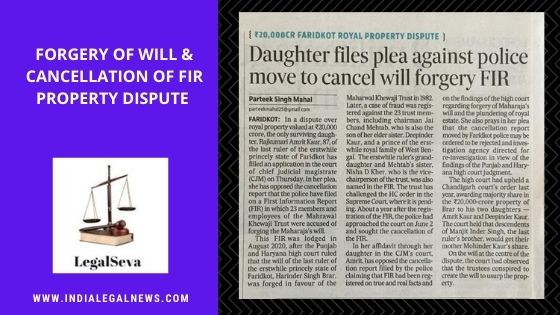Daughter files plea against police move to cancel will forgery FIR
The Faridkot royal property dispute has on for long; in the latest, the only surviving daughter has moved court against the police move to cancel FIR in which 23 members and employees of the Mahrawal Khewaji Trust were accused of forging the Maharaja’s will.
Also Read- FORGED & Fabricated WILL CASE HIGH COURT

FACTS
In a dispute over royal property valued at 220,000 crore, the only surviving daughter, Rajkumari Amrit Kaur, 87, of the last ruler of the erstwhile princely state of Faridkot has filed an application in the court of chief judicial magistrate (CJM) on Thursday. In her plea. she has opposed the cancellation report that the police have filed on a First Information Report (FIR) in which 23 members and employees of the Mahrawal Khewaji Trust were accused of forging the Maharaja’s will.
This FIR was lodged in August 2020, after the Punjab and Haryana high court ruled that the will of the last ruler of the erstwhile princely state of Faridkot, Harinder Singh Brar, was forged in favor of the Maharwal Khewaji Trust in 1982. Later, a case of fraud was registered against the 23 trust members, including chairman Jai Chand Mehtab, who is also the son of her elder sister, Deepinder Kaur, and a prince of the erst- while royal family of West Bengal. The erstwhile ruler’s granddaughter and Mehtab’s sister. Nisha D Kher, who is the vice- chairperson of the trust, was also named in the FIR. The trust has challenged the HC order in the Supreme Court, where it is pending. About a year after the registration of the FIR, the police had approached the court on June 2 and sought the cancellation of the FIR.
In her affidavit through her daughter in the CJM’s court. Amrit, has opposed the cancellation report filled by the police claiming that FIR had been registered on true and real facts and on the findings of the high court regarding forgery of Maharaja’s will and the plundering of royal estate. She also prays in her plea that the cancellation report moved by Faridkot police may be ordered to be rejected and investigation agency directed for re-investigation in view of the findings of the Punjab and Haryana high court judgment.
Also Read- CHEATED AND FORGERY Archives
SECTION/ACT/PROVISION/SETTLED LAW
Section 463 of the Indian penal code:
Forgery.— [Whoever makes any false documents or false electronic record or part of a document or electronic record, with intent to cause damage or injury], to the public or to any person, or to support any claim or title, or to cause any person to part with property, or to enter into any express or implied contract, or with intent to commit fraud or that fraud may be committed, commits forgery.
Section 465 of the Indian penal code:
Punishment for forgery.—Whoever commits forgery shall be punished with imprisonment of either description for a term which may extend to two years, or with fine, or with both.
Section 467 of the I.P.C:
Forgery of valuable security, will, etc.—Whoever forges a document which purports to be a valuable security or a will, or an authority to adopt a son, or which purports to give authority to any person to make or transfer any valuable security, or to receive the principal, interest or dividends thereon, or to receive or deliver any money, movable property, or valuable security, or any document purporting to be an acquittance or receipt acknowledging the payment of money, or an acquittance or receipt for the delivery of any movable property or valuable security, shall be punished with[imprisonment for life], or with imprisonment of either description for a term which may extend to ten years, and shall also be liable to fine.
Also Read- Forging Signature Complaint Chandigarh Panchkula Mohali
LEGAL OPINION
In the present case, as held by the court, the will was found to be forced and fictitious. Forgery , is defined under section 463 of the Indian penal code. It means making false documentations or electronic record with an intent to deceive . to constitute forgery, the document or the electronic record or a part od the document/electronic record must be false, it must have been made fraudulently and, there must be an intent to cause damage or injury to the public or a person. All the three conditions are fulfilled in the present scenario.
The punishment of forgery, as mentioned under section 465 of the I.P.C., is imprisonment that may extend for a period of two years of either description, or with fine, or with both. And this offence is non-cognizable, bailable and compoundable.
Forgery related to will is covered under section 467 of the I.P.C. in the present scenario, the daughters got the majority share in the property owned by their father. And, for forging the documents, the last ruler’s brother will only get the share that their mother had. This judgment was rightly given.
Also Read- Fake Divorce to Marry NRI Case in India
JUDGEMENT
The high court had upheld a Chandigarh court’s order last year, awarding majority share in the 220,000-crore property of Brar to his two daughters – Amrit Kaur and Deepinder Kaur. The court held that descendents of Manjit Inder Singh, the last ruler’s brother, would get their mother Mohinder Kaur’s share.
On the will at the centre of the dispute, the court had observed that the trustees conspired to create the will to usurp the property.
For case specific advice please contact criminal lawyers advocates in Chandigarh Panchkula Mohali Kharar Derabassi Zirakpur
More on 99888-17966.